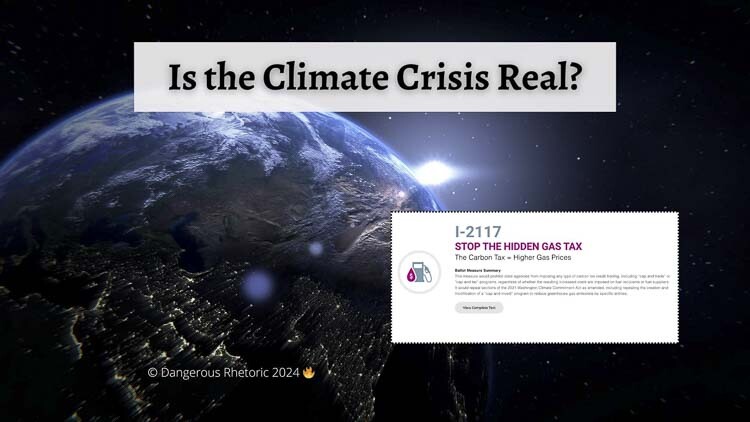
Nancy Churchill encourages support of Initiative 2117, and to put an end to the Climate Commitment Act
Nancy Churchill
Dangerous Rhetoric
Previously, we have discussed the impact of the carbon markets created by Washington’s Climate Commitment Act which went into effect in 2023. Under the law, carbon emitters are required to purchase “emissions allowances” equal to their greenhouse gas emissions. If we assume that carbon is a pollutant that creates a climate crisis, it’s reasonable to assume that we could improve the environment by reducing activities that create carbon.

The carbon market sets a number of allowances which are supposed to be reduced every year. When we reduce the number of allowances, the price of the remaining allowances will go up. If the price of allowances gets too expensive, the Department of Ecology can manipulate the market by releasing extra allowances in order to keep the carbon market “reasonably priced.” Unfortunately, doing this means that emissions are NOT reduced.
Critics of the carbon market argue that since it does not effectively reduce carbon emissions, it’s just a revenue-generating commuter tax that allows polluters to get off scot-free. In addition, the increasing scarcity of “emissions allowances” mean that the cost of fuel and energy will also increase, driving inflation higher and destroying the prosperity of the state.
Given the negative impacts on inflation and prosperity caused by this artificial government-created carbon market, it’s reasonable to ask some simple questions: Do we really need to do this? Is there really a climate crisis caused by carbon emissions?
Follow the climate science
According to research published on RealClimateScience.org by Tony Heller, there is no climate crisis. If carbon in the atmosphere is increasing, it’s not going to have a negative impact.
“The greatest expansion of life on Earth occurred 540 million years ago, when CO2 was at its peak. Atmospheric CO2 levels were more than 15 times higher than they are now. Corals and shellfish evolved during that time. If ocean acidification was a real problem, there would have been no sea life, rather than a massive expansion of life in the oceans.”
Heller points to an article published by NASA in 2016 which informed readers about a study which found that carbon dioxide fertilization is greening the earth. “From a quarter to half of Earth’s vegetated lands has shown significant greening over the last 35 years largely due to rising levels of atmospheric carbon dioxide…”
Heller continues, “CO2 makes plants grow faster and makes them use less water. It does not make them go extinct. As CO2 emissions have increased, crop yields have increased with them.” As crop yields have increased, poverty and hunger have decreased worldwide. Literacy has increased, lifespans have increased, and death from natural disasters has dropped sharply.
The collected evidence in this one article appears to show increased atmospheric CO2 might be a good thing for the world. Heller is not the only climate science skeptic; another is Anthony Waats over at WaatsUpWithThat.com who provides many strong scientific studies on climate change, global warming, and failed climate predictions.
Clearly, life was thriving on Earth 540 million years ago, when CO2 levels were 15 times higher. Clearly, the science is not settled, and those using carbon emissions to control and manipulate society are not really concerned about the overall welfare of humanity or protecting the environment.
Sadly, the “climate crisis” is being used to drive government policy which collects power and control into the hands of a few, to the detriment of the many. There is no climate crisis. But there is an effort to use the environment to destroy our state and our economy.
Support Initiative 2117, and end the Climate Commitment Act.
Nancy Churchill is the state committeewoman for the Ferry County Republican Party. She may be reached at DangerousRhetoric@pm.me. The opinions expressed in Dangerous Rhetoric are her own.
Also read:
- Letter: ‘There will be consequences’Hazel Dell resident Bob Zak criticizes Democratic lawmakers for advancing ESSB 5181, arguing it undermines parental rights and defies biblical principles.
- Op-Ed: La Center Schools — Committed to families and their childrenIn a public letter, the La Center School Board and Superintendent Peter Rosenkranz affirm their commitment to supporting families and honoring both state law and community values amid state-level scrutiny.
- Letter: Mayor blames others on homelessness problem in Vancouver while she has enabled a lawless encampment zoneVancouver resident Peter Bracchi urges city leaders to enforce laws and end permissive policies that have allowed unsafe encampments to overrun public spaces near the Share House.
- Letter: ‘Look it up for yourself’Camas resident Anna Miller encourages skeptics of Elon Musk’s claims about government waste to do their own research using official resources.
- Opinion: Defending the indefensibleNancy Churchill argues that Washington’s lawsuit against a sheriff cooperating with ICE reveals a deeper political agenda that puts public safety at risk.











Tony Heller is absolutely correct. If you are in doubt, just take a close look at the skinwalkers pushing this bs: so-called “scientists” ALL on the government dole, so-called “experts” (lanternjaw Lurch, for example) flying their private jets all over to luxo-pimpo “conferences”, and the diaper-fouling renfields supporting them. All of these “people” seem to forget about that bright, shiny object in the sky so infrequently seen in Washington State. The only purpose of “the climate crisis” is for the skinwalkers to separate LOTS of money from the terrified so the skinwalkers can make fortunes writing “poseidon adventure” disaster scripts. Read “Climate and the Affairs of Men”, by Iben Browning for starters.